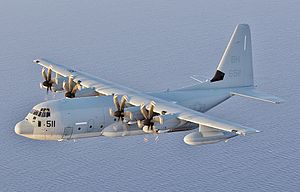
The Lockheed Martin KC-130 is the basic designation for a family of the extended-range tanker version of the C-130 Hercules transport aircraft modified for aerial refueling. The KC-130J is the latest variant operated by the United States Marine Corps, with 48 delivered out of 79 ordered. It replaced older KC-130F, KC-130R, and KC-130T variants, while one USMC reserve unit still operates 12 KC-130T aircraft.
The KC-130F made its first test flight in January 1960 as the GV-1 under the old Navy designation system. First entering service in 1962, the KC-130F was designed to undertake aerial refueling missions in support of USMC aircraft. It was developed from the Lockheed C-130 Hercules.
The newest Hercules, the KC-130J, shares 55 percent of the same airframe as preceding models, but in fact is a greatly improved airplane. It is based on the Lockheed Martin C-130J Super Hercules and provides significant increases in operational capability and performance margins over preceding KC-130F/R/T (legacy) aircraft. Additionally, The KC-130J reduces cost of ownership through system reliability and reduced maintenance man-hours per flight hour.